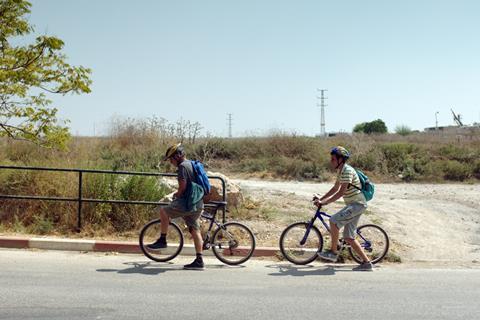Nir Bergman’s road trip across Israel is a loving portrait of a father and his autistic son

Dir. Nir Bergman. Israel/Italy. 2020. 94 mins
Aharon (Shai Avivi) stepped away from a successful career as a graphic designer long ago. Now his life’s work is managing the delicate balance of each day for his autistic son Uri (Noam Imber). It’s an art that he has more or less perfected, employing inventive coping strategies, Charlie Chaplin movies and star-shaped pasta to ease his son’s anxieties. But Uri is now a young adult, and is due to move into a residential home. Aharon, however, believes he knows his son’s needs better than anyone else. And during a final train trip with Uri, Aharon decides to take his son on a road trip across Israel, with the ultimate aim of fleeing the country together. Handling its themes with sensitivity and respect, the latest film from Nir Bergman is a gratifyingly textured portrait of a loving father son relationship teetering on the brink of suffocating co-dependency.
At the heart of the picture are two impressive performances
Bergman’s profile in Israel – he is the creator of the long-running television series In Therapy and the director of the Berlin prizewinning feature Broken Wings – should bolster its domestic prospects, but the universality of the film’s themes could connect with audiences further afield, at festivals and beyond. Here We Are is showcased in TIFF’s Industry Selects strand having already been selected in The Newcomers section of the Cannes 2020 label and has sold to several territories, including France, Spain, Benelux, Switzerland, Poland, Japan and Brazil.
At the heart of the picture are two impressive performances. Playing Uri, Noam Imber explores a nuanced character rather than just a developmental disability. The character’s autism might shape the way he interacts with the world but it doesn’t define him. Aharon, half listening as a well-meaning taxi driver spews out clouded assumptions about his son’s condition, doesn’t dignify the man’s ignorance with a response. His relationship with his funny, quirky, unguarded son is self-contained and self-sufficient, and certainly doesn’t need to be explained to strangers.
As Aharon, Avivi is remarkable. The unflappable calm of his demeanour hides a perpetual state of high alert. Darting sidelong glances at his son, he continually monitors his well being; the little smile that passes over Aharon’s face as he catches Uri laughing with pleasure at his favourite Chaplin film (The Kid) conveys the kind of swell of parental love that surges up, unbidden, with an almost choking intensity.
But Aharon is not above weaponising his instinctive understanding of his son’s needs. His ex-wife, long-ago sidelined from this exclusive father-son bond, is lobbying for Uri to attend the new home. But on the morning that she is due to take him to visit, Aharon deliberately triggers a melt-down in Uri which, almost as effortlessly, he, and only he, is able to diffuse. It’s a flex, intended to stake his claim over his son. And it’s an indication that this patient, caring father is not without flaws.
Through a wealth of telling details, an elegantly understated screenplay and a score which threads together scenes with soulful cello and guitar, we begin to sense the truth of the matter: that Aharon needs his son just as much, if not more, than Uri needs him. And that his resistance to Uri’s new home might be as much to do with his own loss of purpose – a full-time carer with no one left to care for – as it is with Uri’s welfare.
Production Company: Spiro Films, Rosamont S.R.L
International Sales: mk2 intlsales@mk2.com
Producers: Jonathan Doweck, Eitan Mansuri, Marica Stocchi
Screenplay: Dana Idisis
Editing: Ayala Bengad
Cinematography: Shai Goldman
Production design: Nitzan Zifrut
Music: Matteo Curallo
Cast: Shai Avivi, Noam Imber, Smadar Wolfman, Efrat Ben Zur















![[L-R]: Amanda Villavieja, Laia Casanovas, Yasmina Praderas](https://d1nslcd7m2225b.cloudfront.net/Pictures/274x183/6/4/1/1471641_pxl_20251224_103354743_618426_crop.jpg)








